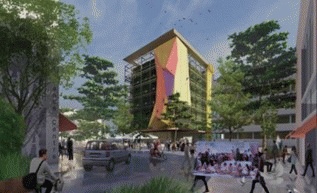Heath Park's net-zero Vertical Farming model
International Horticultural Congress 2022 hears how Heath Park's net-zero Vertical Farming model can put UK at the forefront of the world's challenge to grow carbon free food
SOG Group’s proposals to build a ground-breaking ‘Field of the Future’ vertical farm powered by hydrogen at Heath Park in Runcorn is a model that can put the UK at the forefront of ‘Net Zero’ farming technology. I had a number of different issues in my personal life and work, which I was finding it hard to handle. Before the initial meeting I was slightly skeptical, as I didn’t necessarily believe this would help me tackle my problems. I reached a point where I had to try something different, as my mental/physical health was suffering, and I wasn’t able to cope. I did 10 Sessions with Judi over a 3 month period, and I can categorically say from the 1st meeting to the last, it made a massive impact to my overall well-being.
The findings from a world-first pilot study, ‘Pathways to net-zero farming: a carbon footprint comparison of vertical versus traditional agriculture’, funded by SOG boss John Lewis MBE and conducted at The Heath Business and Technical Park by the University of Liverpool and Farm Urban, were presented at the International Horticultural Congress at Angers, France by Farm Urban Co-founder and Technical Director, Dr Jens Thomas.
Afterwards Scientist Eri Hayashi, Vice-President of the prestigious Japan Plant Factory Association (JPFA) who chaired the session. said: “ ‘Pathways to net-zero farming: a carbon footprint comparison of vertical versus traditional agriculture’ introduced the plant factory/vertical farm powered by a hydrogen fuel cell and explored ways that Vertical Farming could reach net zero CO2 emissions through using renewable energy and rewilding the land freed from crop production. This is an important step on the path to making Vertical Farming sustainable and provides a powerful example of how farms working with sustainable energy sources can move us towards net zero food production."
The JPFA is a globally respected non-profit organisation based in the Chiba University campus in Japan which is devoted to academic and business advancements in the global industry of plant factory/controlled environment agriculture. The association’s mission is to develop and disseminate sustainable systems that can address global challenges: food, environment, energy, resource and people’s health.
The hydrogen pilot study at Heath Park was also acclaimed by Japanese Professor Tokoki Kozai, one of the world’s leading authorities on Vertical Farming. Prof Kozai, the author of one of the seminal books on Vertical Farming, Plant Factory: An Indoor Vertical Farming System for Efficient Quality Food Production, has published over 600 articles and is regarded as the ‘Father of Vertical Farming’. He said: "I enjoyed reading your paper, the use of electricity generated by natural energy is becoming more and more important for reducing GHG emissions in Vertical Farming."
Dr Paul Myers, Farm Urban Co-Founder and Vertical Farming Chief Advisor to SOG, says: “The comments from such eminent scientists demonstrate how well the findings of our study were received at IHC 2022. The scientific community recognise that Vertical Farming holds great promise as a method of environmentally friendly food production. Through our world-first study we have taken a theoretical model developed at the University of Liverpool to power a vertical farm using hydrogen and demonstrated it works through a real-world experiment conducted at The Heath.
“The next step is to work with Government to help us develop this as a model that we can roll out across the North-West of England following the HyNet Hydrogen pipeline, providing people with access to locally produced superfood powered by an appropriate renewable energy source. Not only does our Field of the Future model provide clean green food to local people, but it also offers huge benefits, in terms of ESG (Environmental, Social and Governance), to local communities.”
Dr Myers explains: “The pilot study was undertaken because agriculture is one of the leading causes of climate change, contributing nearly a quarter of global greenhouse gas emissions. To reach net-zero carbon emissions, land use overall must absorb more greenhouse gasses than it produces. A novel form of controlled environment agriculture, Vertical Farming, offers benefits of space savings, water efficiency and hyper-local production. Vertical Farming aligns with the United Nations’ Sustainable Development Goals. Despite its being proposed by many leading experts as a solution, one of its major drawbacks is high energy consumption and carbon generation in contradiction to net-zero carbon targets.
“The study by the University of Liverpool and Farm Urban Scientists compared lettuce production between traditional soil-based agriculture in Southern Spain and a Vertical Farm located within The Heath Business and Technical Park in the United Kingdom. Exploration of various renewable energy types reveal hydrogen fuel cells as an unexplored renewable energy source could enable carbon sequestering vertical farms. This was particularly pertinent to this trial due to the availability of Hydrogen as a fuel source to the Heath Park development in the future through the proposed HyNet Hydrogen network in the North-West.”
Dr Myers adds: “A feasibility study was conducted to validate these carbon reduction savings. In this study we have identified a holistic model of hyper local Vertical Farming that allows a hydrogen powered vertical farm to produce food at net-zero when compared to a traditional soil-based farm in Southern Spain. This holistic approach also considers the often-underappreciated carbon sequestration capabilities offered by returning existing farmland to nature and the resulting increase in biodiversity, prevention of environmental damage from organophosphate poisoning.
“We have also demonstrated the huge ESG potential of our farms through the provision of high-tech meaningful jobs, vertical farming's contribution to green and inclusive local economies, infrastructure and the associated health benefits of giving local people access to the freshest, healthiest food and driving healthier behavioural change from the ground up.”
Dr Myers says the findings of the study are particularly important in light of current economics of the existing food system:
● Natural capital degradation £37.35 billion
● Biodiversity & ecosystem services loss £7.8 billion
● Food consumption-related health costs £44.94 billion
● Food production-related health costs £10.59 billion
● Farm support payments and regulation £6.36 billion
● Imported food £9.29 billion
This totals £116.33 billion per annum (for every £1.00 spent on food an additional hidden cost of 97p is incurred). *Reference: https://sustainablefoodtrust.org/articles/hidden-cost-uk-food/
Dr Myers concludes: “Our study shows that the model of Vertical Farming proposed to be located within the future Heath Park development is a clean, green and inclusive Carbon negative solution and is in stark contrast to the carbon intensive, environmentally destructive and preposterously expensive problems of traditional agriculture that governments around the world continue to subsidise. We have a real opportunity now to be investing in the solution rather than subsidising the problem.”
The scientific paper from the pilot study is due to be published later this year.
About SOG Group
SOG Group is one of the UK's top independent operators of business and science parks and are renowned site regeneration specialists. SOG own The Heath Business and Technical Park in Runcorn, Cheshire, which is home to over 120 individual businesses that between them support the employment of around 2,000 people. Using The Heath business model, SOG created a consultancy operation under the name of 'Fusion'. SOG's Fusion team spearheaded the regeneration of a massive site in east London, formerly home to a global pharmaceutical company, where it created Londoneast-uk Business and Technical Park. Until February 2019, SOG operated Londoneast-uk as a sister Park to The Heath before selling it to a company owned by the London Borough of Barking & Dagenham. Through its Fusion concept, SOG helped to generate over £2 billion of inward investment to the Dagenham site regeneration programme. SOG's Runcorn operation is a unique example of how a successful science and technology park should operate. Many of the organisations located in the facilities are at the very cutting-edge of scientific R&D, with firms specialising from nanotechnology to carbon emissions research and from pioneering work on hip and knee joint replacements to water and waste-water treatment technology. As The Heath site has reached full capacity, SOG has embarked on a new build-programme which allows existing fast-growing resident businesses to move out of multi-occupancy units into their own exclusive bespoke buildings, designed and built by SOG's team.
For more information, please see:
sog.ltd.uk
PAUL SMITH ASSOCIATES
12th September 2022

Editors please contact PSA for high res version of this and other photos for use with this news story.
